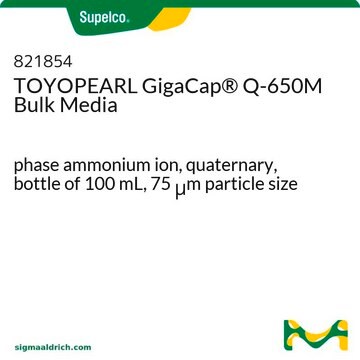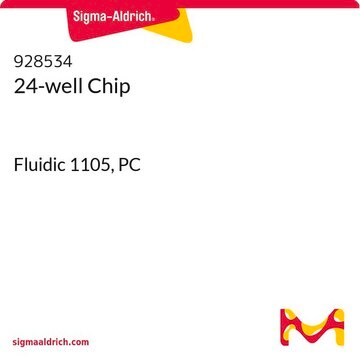912298
NanoFabTx™ microfluidic chip
for 10-30 μm particles
Synonym(s):
Microfluidic kit, Microparticle, NanoFabTx™, Nanoformulation
Sign Into View Organizational & Contract Pricing
All Photos(2)
About This Item
UNSPSC Code:
41121800
NACRES:
NA.23
Recommended Products
description
Microfludic hardware kit component for synthesizing 10-30 μm microparticles
Kit components : Microfluidic chip x 1
Quality Level
application(s)
advanced drug delivery
Looking for similar products? Visit Product Comparison Guide
Related Categories
General description
NanoFabTx™ microfluidic chip, for 10-30 μm particles is a component of our NanoFabTx™ microfluidic - micro, device kit for synthesis of 10-30 μm particles (911879). The kit additionally includes a protocol, supporting manifold, tubing, and additional accessories for microfluidic-based synthesis.
Application
NanoFabTx™ microfluidic chips precisely control and manipulate fluids on the microscale. Their well-controlled geometries enable facile syntheses of monodisperse polymeric microparticles. NanoFabTx™ microfluidic chip, for 10-30 μm particles particles can be used as a replacement for the component in our NanoFabTx™ microfluidic - micro, device kit for synthesis of 10-30 μm particles (911879).
Legal Information
NANOFABTX is a trademark of Sigma-Aldrich Co. LLC
related product
Product No.
Description
Pricing
Certificates of Analysis (COA)
Search for Certificates of Analysis (COA) by entering the products Lot/Batch Number. Lot and Batch Numbers can be found on a product’s label following the words ‘Lot’ or ‘Batch’.
Already Own This Product?
Find documentation for the products that you have recently purchased in the Document Library.
Samar Damiati et al.
Genes, 9(2) (2018-02-22)
Microfluidic devices present unique advantages for the development of efficient drug carrier particles, cell-free protein synthesis systems, and rapid techniques for direct drug screening. Compared to bulk methods, by efficiently controlling the geometries of the fabricated chip and the flow
Andrew Gdowski et al.
Journal of nanobiotechnology, 16(1), 12-12 (2018-02-13)
The process of optimization and fabrication of nanoparticle synthesis for preclinical studies can be challenging and time consuming. Traditional small scale laboratory synthesis techniques suffer from batch to batch variability. Additionally, the parameters used in the original formulation must be
Xuanyu Li et al.
Advanced drug delivery reviews, 128, 101-114 (2017-12-27)
Microfluidic chips allow the rapid production of a library of nanoparticles (NPs) with distinct properties by changing the precursors and the flow rates, significantly decreasing the time for screening optimal formulation as carriers for drug delivery compared to conventional methods.
Our team of scientists has experience in all areas of research including Life Science, Material Science, Chemical Synthesis, Chromatography, Analytical and many others.
Contact Technical Service




